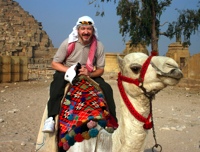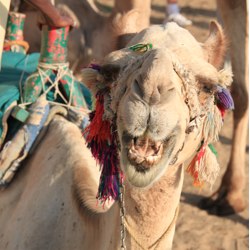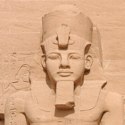I loved our trip to Egypt. I loved the people and the sites but occasionally things came up where I realized that even when people were speaking to me in English, some words did not mean the same thing in Egypt as they did in the U.S.
- Illegal – The first time that I realized that a word our guide was using had a different meaning was when he was pointing out a tuk-tuk on our way back to Cairo. These small motorized rickshaws are imported from India and China. “These are illegal in Egypt” he told us. Then proceeded to tell us that there were over a million of them and that people bought them from the tuk-tuk dealerships that were easily found in every city.
- Forbidden – I am used to photography being forbidden in certain historic sites so I always try and check before I take pictures to see if it is allowed. What I was not prepared for was guards who were encouraging me to take pictures anyway. This first happened at a small temple next to the Great Pyramid on our first day. Our guide explained that the guards only make about $2 a day and need to supplement their income to live. So they encourage you to take forbidden photographs… for a price of course.
- Included – Our guide had trouble with this word as he tried to communicate it to varies camel and horse carriage drivers. He was paying them a tip directly and explicitly told them all not to ask their passengers for an additional tip. All of them asked anyway.
- Authentic – Our guide told us before our first stop that people would offer us many different products that were “authentic” and “made in Egypt”. Most would be made in China. “Buy them if you like them” he told us, but just know what you are getting. Similarly things made of stone were sometimes made of plastic and things made of papyrus were made of banana leaves. There may be truth in advertising laws in Egypt, but if there are they certainly don’t apply at the tourist stops.
- No – When the 12th person came up to me to sell me an authentic (fake) carved (molded) stone (plastic) pyramid and I said “no”, they assumed I was negotiating. If there is a phrase that means “no thanks, I really don’t want to buy what you have”, I never discovered it.
This is one of the posts that gets me in trouble because it sounds negative, but my real point is more that Egypt is different and to just accept some of those differences. Too often we travel to someplace because it is different but then complain that it is different. So let me leave you with a more positive difference.
- Long Time – Our guide told us that when two friends see each other who have not seen each other in a “long time” it is custom to hug and kiss on the cheek. How long is a long time? According to him it was 2 weeks.
Egypt is a more intense culture than the U.S. and most western countries. They bargain harder, they argue louder but they may also cherish friends greater.
- Get an eSim to be able to use your smartphone abroad.
- Buy Travel Insurance
- Search for Great Tours HERE
- Get a universal plug adapter
- Get a Car Rental
- Book Your Accommodation HERE
+Chris Christensen | @chris2x | facebook


 Places to Visit in Egypt – There is No Place Like Egypt
Places to Visit in Egypt – There is No Place Like Egypt Travel to Egypt – Episode 36
Travel to Egypt – Episode 36 Photo Tour of Egypt – Episode 255
Photo Tour of Egypt – Episode 255 Photography Tour to Egypt – November 5th, 2010
Photography Tour to Egypt – November 5th, 2010

Diana Nguyen
Says:November 28th, 2010 at 4:15 pm
I found myself nodding & chuckling after each bullet point because although I haven’t been to Egypt, I think this list pretty much applies to a lot of SE Asian countries too (well, except for the the hug & kiss on the check part).Thank you – that was really enjoyable to read! 🙂
Ffion
Says:December 2nd, 2010 at 4:49 am
Brilliant, Chris! Our experience on the trip too.